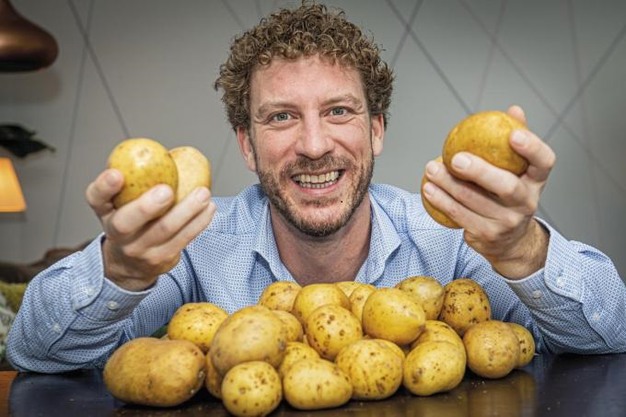"It seems the sky's the limit. There are no issues on the demand side," is how Christophe Vermeulen interprets the current processed potatoes market. He is the CEO of Belgapom, the Belgian potato trade and processing industry's trade association. "Between 1990 and 2020, processing in Belgium increased tenfold, a massive growth. That jumped again during the pandemic. In 2022, the country reached over 6.2 million tons of processed potatoes for the first time; an absolute record."

"We're exporting more and more, and global demand is growing, especially in Europe and the United Kingdom. For that, of course, we need capacity and, most importantly, potatoes," Christophe begins. Yet, filling that growth is proving challenging. Although Belgian potato acreage increased by six percent this year, the higher contract prices concern him regarding the space available for growing potatoes. That acreage’s limits have just about been reached, and it is under pressure.
Ever-changing legislation
Here, legislation is one of the most influential factors. "Our biggest concern is the constantly changing legislation," says Christophe. In 2022, the Minister of Environment had a far-reaching proposal for the Manure Action Plan's implementation. In response, sectors like the processing sector and agricultural and nature organizations came to an agreement. Contrary to the minister's proposals, this provides a workable situation but also implies a decrease in available agricultural land, Christophe notes, saying, "The deal mentions buffer strips for arable farming and nitrate-sensitive crops, such as potatoes. That eats into acreage here and there. Also, we go from a 1-in-3 to a 1-in-4 fruit rotation, which doesn't help either."
Vermeulen also expects the measures in the Nature Restoration Act - passed by a narrow majority in the European Parliament on July 12 - to put further pressure on the available agricultural land. "We must ensure legal guarantees so we don't constantly encounter problems. We fear there will be permit issues, among other things, around the newly restored nature reserves. Here, too, available acreage for intensive arable farming will be lost. That greatly concerns us," he says. Then there is the Walloon Erosion Law, which Christophe says is being reviewed, following pressure from agricultural organizations. "That, as already approved, will lead to the loss of thousands of hectares of potato-growing space."
Available acreage under pressure
There is also competition between different potato sector segments, which puts even more pressure on available acreage. "The fresh market and processing sector each need their own space. The industry is putting some pressure on fields where fresh-market specific varieties are grown. If industry contract prices increase, growers are more inclined to work with the industry. Industry potatoes also have easier market access in, if necessary, the flake line. Things are still working out for now, but the pressure is rising," Christophe explains.
"All these factors mean increasingly less acreage on a market already under quite some pressure to produce as much as possible." Christophe points to imports as a solution. That mainly involves France, but also Germany and the Netherlands. That does bring cost efficiency problems, though. "Our biggest strength has always been our supply, with narrow, dense supply lines, low transport costs and great efficiency. If all our potatoes have to come from, say, Bordeaux, we'll lose some of that advantage," he says.
Game changer
Besides the changing climate, where dry and wet periods increasingly affect cultivation, and the high costs associated with Belgium's Leasing Act, Christophe considers the declining crop protection package a challenge. "With no sufficient, powerful alternatives, in the short term, we'll have to take open-field vegetable and potato productivity losses into account." The CEO, thus, welcomes the EU bill on genetic modification of certain crops, which cautiously opens the door to using new breeding techniques.
"That could be a game changer for us. We're more than willing to invest in that because, ultimately, quality improves, and you create more resistant, better potatoes in a rapidly changing climate. With current potato varieties and under these dry conditions, we cannot guarantee quality and productivity year after year. We, thus, have to make adjustments, and I hope we can take steps forward in that," Christophe continues.
Fresh market
While the French fries sector faces challenges filling a growing market, Christophe has observed the fresh market gradually declining over the last decade. "That goes for fresh potato sales and consumption." He blames the many alternatives available to replace potatoes as a meal component. The - unjustified - image of it being a filler also complicates sales. "We want to change that. Potatoes are vegan, gluten-free, a source of various vitamins, and even more nutritious than rice. Plus, they need far less water to grow than rice," Christophe points out. Belgapom is committed to promoting potatoes' versatility, nutritional and health values and boosting their use.
"Peeled and precooked potato as well as air fryer, (microwave)oven products and small packaging sales are, however, increasing. Packers are betting more and more on that." But European regulations affect that packaging. That represents a challenge and cost for packers, Vermeulen notes, adding, "Consumers want washed potatoes in small bags. There are ever-increasing demands on the materials used to make those small bags. That makes it harder for packers, who have to constantly adjust their strategy accordingly. In the last two years, their costs have skyrocketed. Of the cost hikes in fruits and vegetables, 40% of both processing and packaging costs couldn't be passed on to the public."
Bintjes
Regular and French fry restaurants' demand for potatoes is also up. "In that segment, people still far prefer new Bintjes," Christophe admits. There, acreage plays a role, too, and he sees that fields where Bintjes traditionally grew are now almost entirely replaced by industrial potatoes. "Bintjes are important to many French Fry restaurants; it's nostalgic, but there's also the flavor factor. These potatoes still have that, so people want to keep using Bintjes. But there are fewer and fewer growers willing to grow Bintjes because the variety is disease-prone. There are easier crops to cultivate."
"Grower/processor potato traders are still doing okay, too." However, Christophe does see some problems in that area. "These traders mainly fill the holes when there's more industry demand than contracted potatoes. They're useful but also face risks. Negotiation is simple in a direct contractual grower/processor relationship if there are issues, like decreased yields. Traders are somewhere in between and have a harder time protecting themselves," he reckons.
Sustainable cultivation investments and innovation
Despite the many challenges facing both growers and traders, there are opportunities, too, says Christophe. "I think sustainably optimizing potato production offers opportunities." Here, he refers to varieties and methods that allow production to remain consistently high. "These attempt to negate unforeseen circumstances, like climate change, conditions, as much as possible," the CEO states, but he admits that may be wishful thinking. "Still, it's the only solution. There's no other option if we want more people to eat fresh potatoes and want to remain the world's leading, exporting potato processing nation."
Christophe does not believe more extensive cultivation methods will achieve that sustainability aspect. "We have to start from our strength. The Low Countries have needed intensive agriculture for a thousand years because of our soil and dense population. We don't have bananas, avocados, or soybeans. We have potatoes and open-field vegetables. That's what our soil is best suited for, and these are the products we should keep producing. That's our strength, and we can be quite proud of it. We need to find a solution, and we will. That will require investment, innovation, and much adjustment towards more precise, sustainable agriculture," he concludes. (MW)
Voor meer informatie:
Christophe Vermeulen Belgapom
Belgapom
Sint-Annaplein 3
9290 Berlare, België
+32 9 339 12 49
[email protected]
www.belgapom.be
